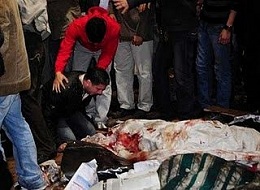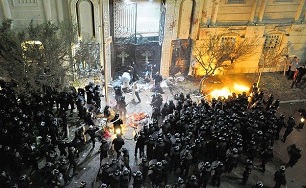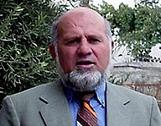My advice to Egypt
The New Year bombing in Alexandria, which killed as many as 25 innocent people, nearly all of them Christian Copts, shocked Egypt and the Arab world. It infuriated Christians and Muslims alike as the criminals crossed the Rubicon in their terrorism, something that many – including myself – never thought would happen.
It is probably too early to determine the identity of the perpetrators, although there are signs indicating that the bombing may have been the work of al-Qaeda, which could indeed carry out the unthinkable. However, it is absolutely vital that any subsequent treatment of terrorism should go beyond the mere identification and punishment of those responsible if it is to be genuinely effective. In this case, it would be insufficient to rely on a security response alone. Egypt must do everything possible to eradicate the environment conducive to terrorism, not just the acts of terror themselves.
Such a move would require religious, cultural and political action as well as a security response. The sword alone cannot guarantee internal peace and security in any state. Even states with none of Egypt’s complex social, political and economic problems can guarantee to be free of terrorist acts.
Although government agencies might be tempted to take some hasty short-term measures to appease public opinion, this would be at the very best a futile reaction prompting further terror and bloodshed.
My advice to the government of Egypt is to adopt rational means to uproot religious extremism, especially against groups indoctrinated in al-Qaeda style ideologies. From experience, the most effective way to do this is by encouraging moderate Islamic groups, such as the Muslim Brotherhood, to foster the true message of Islam, the message that preaches moderation, a vibrant civil society and equality, irrespective of religion and ethnicity.
It is no secret that the Egyptian authorities have been waging a relentless wave of repression against the Muslim Brotherhood for reasons that can be viewed as trivial. Members have been hounded, arrested and beaten badly; their businesses and personal belongings have been ransacked and confiscated in ways reminiscent of medieval practices.

As a result, it is not beyond the realms of possibility that impressionable young Muslims, frustrated by the inequalities in Egyptian society, believe that moderation doesn’t pay and the only way to effect real change is by using violence and terror. In the Gaza Strip, Muslim Brotherhood imams succeeded in isolating al-Qaeda’s ideas by demonstrating to misguided elements their incompatibility with true Islam. Thankfully, many people have now moved away from the extremist views of al-Qaeda.
Some people might think that the deployment of the scholars of Cairo’s Al-Azhar University at the forefront of the ideological confrontation with al-Qaeda is sufficient to enlighten the extremists and save them from heresy. Nevertheless, even if the scholars of Al-Azhar happen to be the best and most erudite doctors of religion, they would still be viewed as agents of the Egyptian regime and would therefore be mistrusted and rejected. Such Ulema would be dismissed even if they produced the most convincing evidence from the Qur’an and the Sunnah of the Prophet, may peace be upon him. I am sure that the Egyptian authorities know this all too well, but it has become taboo for the government to acknowledge its own failures, so it is likely to use the same old methods which have been proven repeatedly to be useless.
I understand that it might be embarrassing for the Egyptian government to seek help from the Muslim Brotherhood for the purpose of eradicating religious extremism. However, the task of maintaining civil peace and protecting the Egyptian people should override all other considerations. In short, the Egyptian government should travel any road and take any risk in order to shield the people of Egypt from the terrorists. Moreover, the government must not appear to favour one part of society at the expense of another. This would cause real uproar in many quarters.
Hence, the Egyptian government itself must exercise self-restraint and rein in any temptation to target innocent groups just because it appears politically expedient to do so. Such a course of action would only generate more rage and store up yet more problems for the future.
We know that Egypt has a huge reservoir of wise men and women who are capable of isolating and liquidating the ghoul of terror. The Egyptian authorities should, therefore, hold sincere consultations with the best brains in the country over the issue of terrorism; even the most anti-government elements should be included in the exercise.
The government needs to get as close as possible to the people it governs; a relationship based on trust between the people and government should be encouraged. If that happened, virtually every member of society would be transformed into a willing intelligence officer. On the other hand, if ordinary people continue to be treated as subjects rather than citizens and real grievances are allowed to fester, the consequences could be disastrous.
Finally, Egypt should be vigilant about Israel and its intentions. "Al-Qaeda" is an easy scapegoat to distract investigations into terrorist acts from other potential perpetrators, including the Israeli Mossad, which is not above carrying out such acts as the Alexandria church bombing to foment civil unrest in Egypt. The Egyptian intelligence services have long experience with the way that Mossad operates. The Israelis should never, ever be given the benefit of the doubt.
___________________________________________________________________________________
Khalid Amayreh (Arabic: خالد عمايرة, b. 1957 Hebron) is a Palestinian journalist based in Dura, near Hebron. Amayreh has experienced years of restrictions on his activities and travel, including imprisonment. Some of his many articled can be found here: http://www.xpis.ps/
Amayreh has been a correspondent with numerous newspapers and news outlets:
● Sharja TV, correspondent, 1994-2001
● Iranian News Agency (IRNA), 1995-2006
● Middle East International (London) 1995-2003
● Al-Ahram Weekly (English) 1997-present
● Aljazeera English (aljazeera.net): 2003-2006
● Palestine Information Center: 2000-present.
● Palestine Times (daily newspaper) (has ceased publication)
Furthermore he is a prolific freelance writer contributing to many websites, e.g., The Palestinian Information Center, The People's Voice, PalestineThinkTank, Uprooted Palestinians and Al-Ahram Weekly.
Books
● Journalism and Mass communication, Theory and Practice (Arabic, 1996)
● Refutation of Western Myths and Misconceptions about Islam and the Palestinian question (Arabic, 1988)
● Living Under the Israeli Occupation, (Forthcoming)
Resources
List of Amayreh's articles in French
List of Amayreh's articles in Spanish
[Information gleaned from Wikipedia and PIWP Database]
___________________________________________________________________________________
Photo: http://www.latimes.com/media/photo/2011-01/58545149.jpg
URL: http://www.a-w-i-p.com/index.php/2011/01/10/my-advice-to-egypt


























